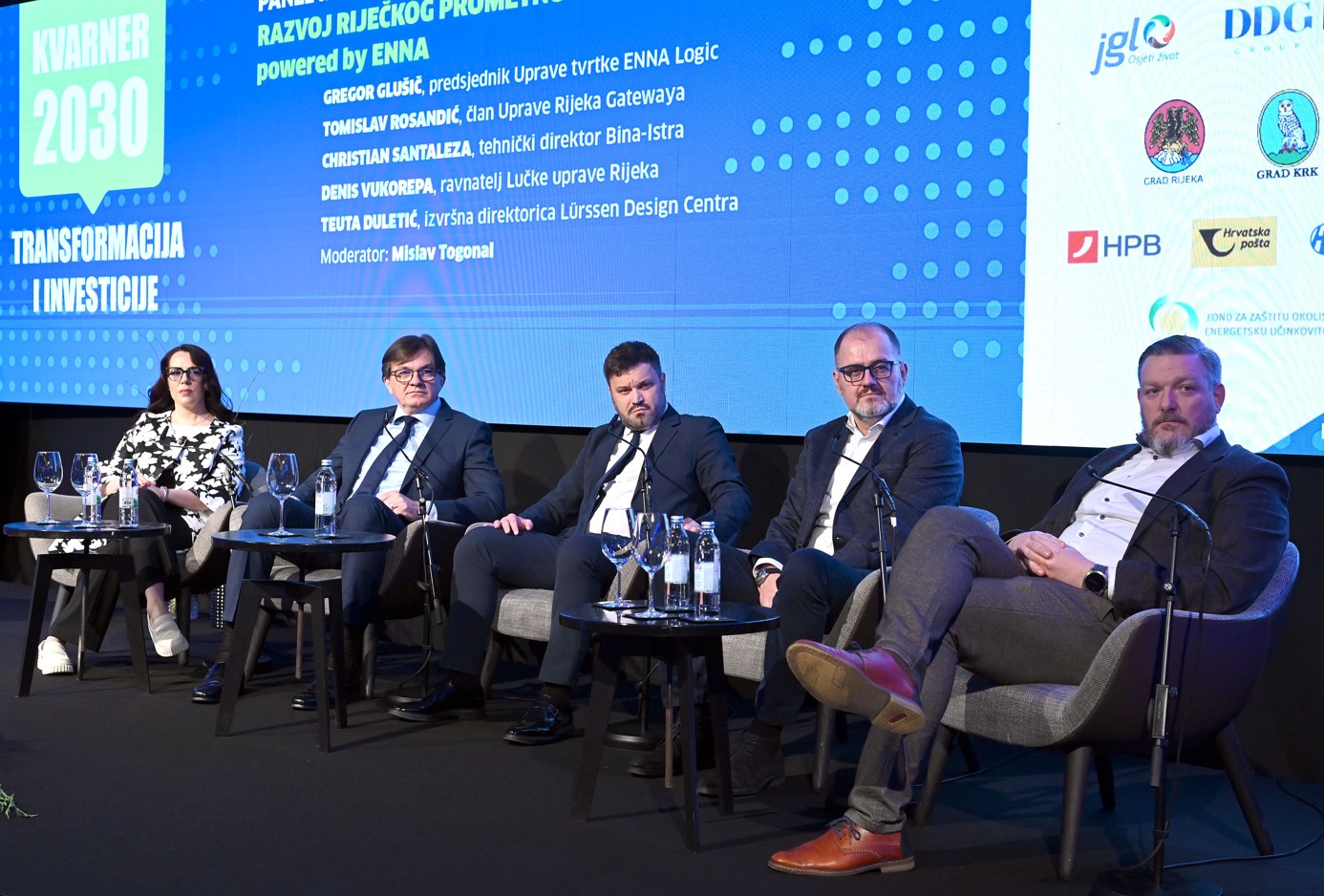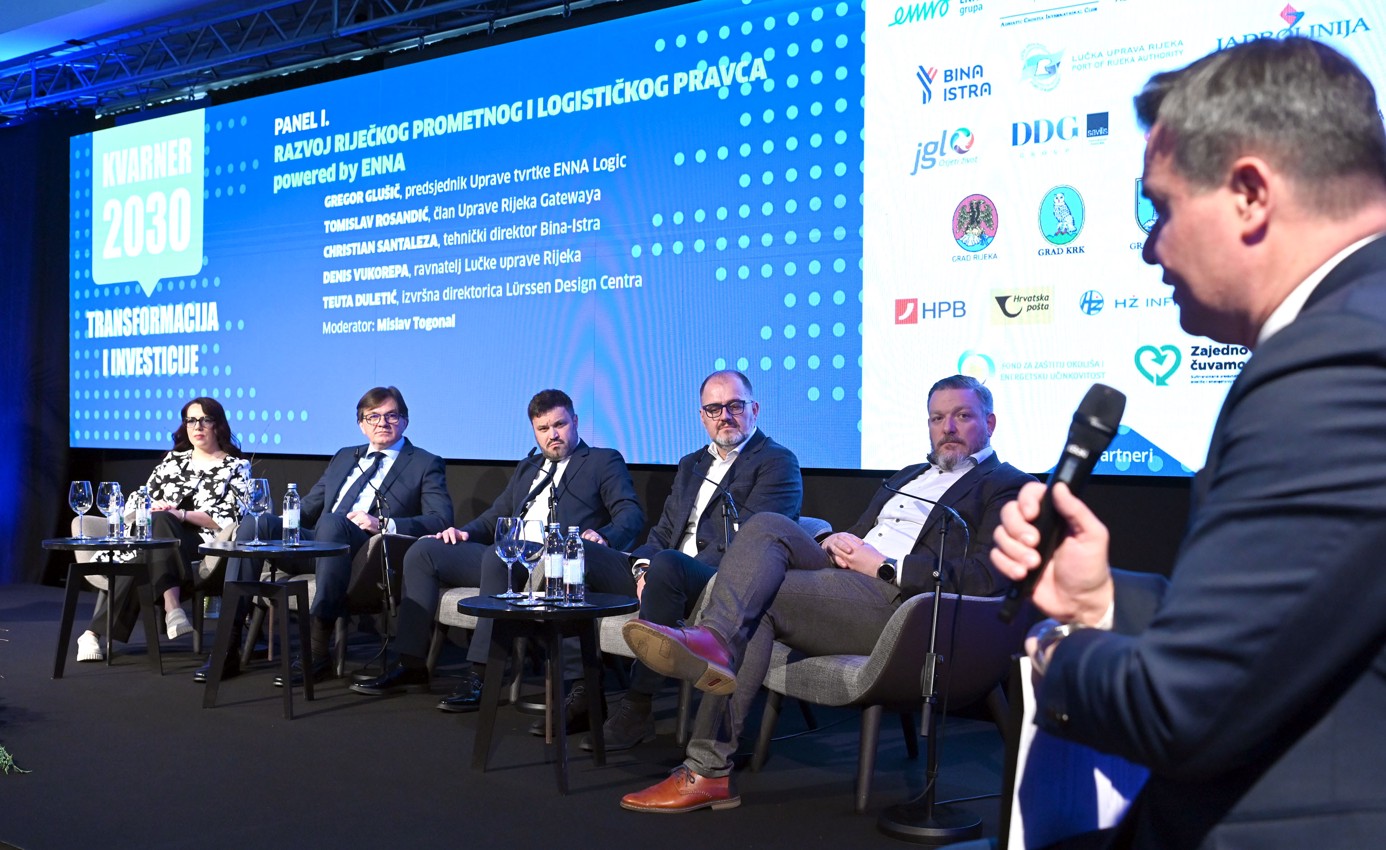Gregor Glušič participated in the conference “Kvarner 2030 – Transformation and Investments”
The CEO of ENNA Logic and ENNA Transport at the Novi list conference
Date publishedNovember 21, 2024
Opatija, 20 November, 2024 – Gregor Glušič, CEO of ENNA Logic and ENNA Transport, participated in the Novi list conference “Kvarner 2030 – Transformation and Investments” on Wednesday, 20 November 2024, in Opatija. The conference gathered numerous leading experts from various economic sectors, including transport, logistics, and tourism, alongside representatives of local and regional authorities and institutions. The discussions focused on a vision for Kvarner’s development by 2030.
In the first panel discussion, dedicated to the development of the Rijeka transport and logistics route, Gregor Glušič was joined by Tomislav Rosandić, Management Board Member of Rijeka Gateway; Christian Santaleza, Technical Director of Bina Istra; Teuta Duletić, Executive Director of Lürssen Design Center Kvarner; and Denis Vukorepa, Director of the Port Authority of Rijeka.
At the start of the discussion, Glušič announced that the new Rijeka Gateway container terminal at Zagreb Pier would begin operations next year. Addressing the logistical challenge of handling the projected one million container units, he explained that a significant portion would be transported by sea.
“Of the one million containers arriving at the terminal, not all will be transported inland. About 40% of the traffic will be directed to other ports with draft limitations. These containers will be transshipped in Rijeka from the largest vessels, which some ports cannot accommodate. The remaining 60% will be transported inland, with a large portion going by rail. Specifically, we plan for 60% to move by rail, which is why an intermodal terminal has been constructed alongside the container terminal,” Glušič stated.
He commented on railway congestion and noted that ENNA Logic is addressing this issue through investments. “We’re investing in more equipment, locomotives, and wagons to meet commitments to our clients. Generally, railway investments are happening in all neighbouring countries. I don’t see this as a problem but as development. In six to seven years, we’ll have railways enabling faster and more efficient freight and passenger transport. Most delays today result from railway closures due to construction, but we must not forget that soon, from Zagreb to Hungary, we’ll have a double-track railway, something unthinkable a decade ago,” Glušič emphasized.

The most modern terminal in this part of Europe
Rijeka Gateway board member Tomislav Rosandić presented the future Rijeka Gateway container terminal.
– The terminal is almost completely electrified, with no noisy diesel engines. Noise pollution will also be reduced by eliminating the “beep” sound during the movement of cranes and other equipment and by introducing so-called white noise. There is also a system to slow down the containers’ lowering so they do not hit each other hard. We also have a highly efficient drainage system without the possibility of polluting the sea and the environment with wastewater. As for light pollution, we will use shades and directed light, as the parts of the terminal that are not being worked on will not be illuminated. In addition, the ships will be supplied with electricity from the land, which will also reduce noise pollution and emissions of gases and particles, and the terminal itself will use only electricity produced from renewable sources for its work, for which a contract has already been signed with the supplier - said Rosandić. He also pointed out that the terminal will significantly impact the labour market because it will employ more than 300 people, on which RGW is cooperating with high schools and colleges in the Rijeka area.
Glušič reminded that the multiplier factor, when it comes to workplaces connected to the terminal, is five.
- This means that if the terminal employs 300 people, 1,500 people will be employed in related workplaces in other companies and institutions, which, along with the development of economic activities and projects, is perhaps the most important for the city and its surroundings - concluded Glušič.
You can read more about the panel and conference “Kvarner 2030 - transformation and investments” on the Novi List portal.
Selected news
#LogisticsMore news >Meet the young train drivers of ENNA Transport
Interview with ENNA Transport locomotive driver Valerija Androtić for Index on the occasion of International Women's Day
Railway renovation completed – ENNA Transport trains from the Port of Ploče running again through Bosnia and Herzegovina
Gregor Glušič participated in the conference “Kvarner 2030 – Transformation and Investments”
Leon Dolušić from ENNA Transport at the "Transport and Logistics" conference